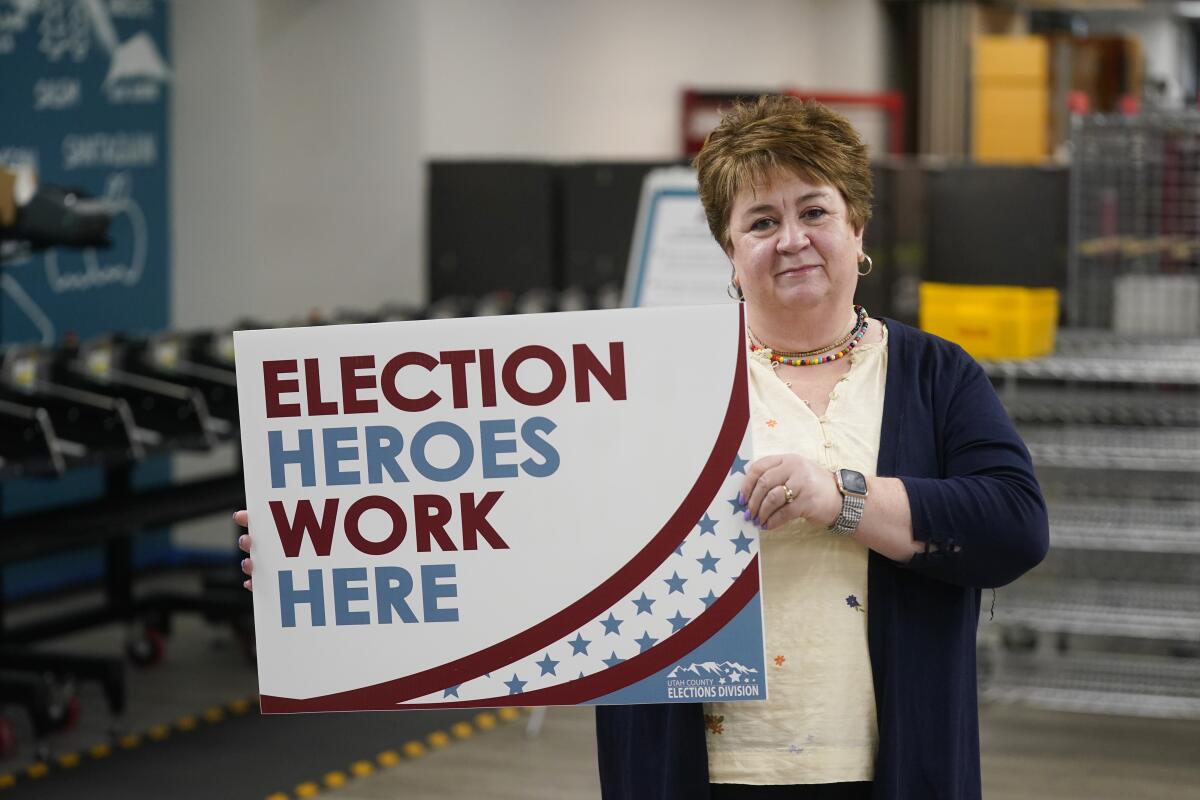Deep-red Utah embraced voting by mail. Then came 2020

- Share via
PROVO, Utah — As Dewon Holt toured a Utah ballot counting center, she listened intently and questioned election officials about concerns circulating since the 2020 election — about voting machines, people mailing multiple ballots and dead people voting.
Holt came away confident in the integrity of the vote count after the tour in one of the state’s Republican strongholds and even suggested election officials do more to publicize the tours.
“Because we had this national fraud thing going on, everybody thinks there’s fraud here,” the 76-year-old Republican said in Provo. “I feel like Utah County is good. But I don’t know if we have problems in the rest of the counties in the state.”
Distrust in elections continues to reverberate around the U.S. and subjects election officials to new levels of scrutiny, even in Utah, where universal mail-in voting has been widely embraced since the GOP-controlled Legislature allowed counties to adopt the policy a decade ago.
Pushed by constituents like Holt swept up in fears of widespread fraud — stoked by former President Trump’s baseless claims related to the 2020 election he lost — lawmakers made election security a central focus this year, with 35 proposals considered.
They ultimately passed laws tightening voter identification rules, requiring 24-hour surveillance at ballot drop boxes and making it easier for people to opt out of mail voting, but rejected more drastic proposals, including one to end universal vote by mail altogether.
Despite a newfound focus on outreach and education from election officials, doubters remain. Opposition to the state’s vote-by-mail policy has grown.
“It’s completely upended the work that election officials do,” said Lt. Gov. Deidre Henderson, Utah’s top election official said of election misinformation. “What gets really problematic is when the fervor from a loud few in the populace gets to elected officials. And then the elected officials start saying, ‘Well, I got to address the concerns.’”
Utah, a state Trump won by 20 percentage points in 2020, is the only Republican-led state to mail all active voters ballots each election. A decade before Trump called mail voting “the greatest scam in the history of politics,” lawmakers championed the practice as a way to boost turnout and make voting more convenient in rural areas.
By 2019, every county in the state had opted into the state’s policy allowing counties to mail all active voters ballots, making Utah the fourth state to conduct “all-mail” elections. On election day, a limited number of polling places remain open.
The practice was so popular that in Utah County there was an outcry from residents after officials in 2018 decided against mailing ballots to all active voters. “This is just blatantly wrong. It isn’t the American way,” a city official said about the decision at the time. “Don’t we want high turnout?”
The county later reversed the decision.
Fast-forward several years: Mail-in ballots remain the overwhelmingly popular method for voting, with 92% using them in the 2020 general election. But disproven claims that they open the door for widespread fraud are transforming the policy discussion, provoking rancorous opposition and newfound skepticism.
Opponents crowded five overflow rooms to listen to a legislative hearing on a proposal to abolish universal voting by mail earlier this year. Fresh off a failed effort to qualify a measure for the 2022 ballot that would end voting by mail in Utah, members of the anti-mail-ballot crowd referring to themselves as “We, the People” said they had heard of ballots mailed to voters who had died and urged lawmakers to require postelection independent audits.
Opposition to mail-in ballots has emerged in other GOP-led states that expanded the practice before the 2020 election. In Nebraska, counties with fewer than 10,000 people may conduct all-mail elections. In Georgia, the secretary of state mailed absentee ballot request forms to every voter ahead of the 2020 election.
In many of these places, a schism has emerged between veteran Republican lawmakers who considered election-related bills for years before they became politicized and ones who ascended to office during the Trump era. In Georgia, Republicans since 2005 have gradually expanded practices such as early voting and no-excuse absentee ballots. Ed Lindsey, a former state lawmaker who now serves on Georgia’s election board, said he observed such a generational divide.
Last year, veteran lawmakers, Lindsey said, were prepared to tweak rules that he said would make ballots more secure, but fought efforts to end no-excuse absentee voting. “They certainly weren’t prepared to throw the baby out with the bathwater because they’d seen that this was something their constituents liked,” he said.
Georgia lawmakers ultimately kept no-excuse absentee voting but added provisions making it more difficult to request mail ballots. Election officials there and in Utah are unsure whether trends will continue showing more people choosing to vote by mail, or whether opposition will lead people to return to polling places.
In Utah County, the rancor contributed to the county clerk’s decision not to seek reelection. Unlike what he and others in the election office had grown
accustomed to before 2020, officials are “facing a constant barrage of scrutiny,” Clerk Josh Daniels said.
Daniels’ likely replacement, Republican Aaron Davidson, is a universal-vote-by-mail opponent who told an applauding audience in a March debate he planned to petition the Legislature to end the practice.
Davidson says he would follow state laws, which require he mail all active voters ballots. “But I’m going to do everything I possibly can to make sure if we’re doing vote by mail, it’s going to be as clean as possible,” he said in an interview.
State Rep. Steve Eliason, a Republican who sponsored the 2012 legislation allowing counties to implement all-mail elections, said its opponents were vocal but still very much a minority. Regardless of the growing number of calls he may field about elections, he’s confident universal voting by mail will survive challenges, even in deep-red Utah.
“We got ahead of the curve when it wasn’t politicized,” he said. “It’s largely been institutionalized. They’re what people are used to. It’s convenient.”
More to Read
Get the L.A. Times Politics newsletter
Deeply reported insights into legislation, politics and policy from Sacramento, Washington and beyond. In your inbox three times per week.
You may occasionally receive promotional content from the Los Angeles Times.










